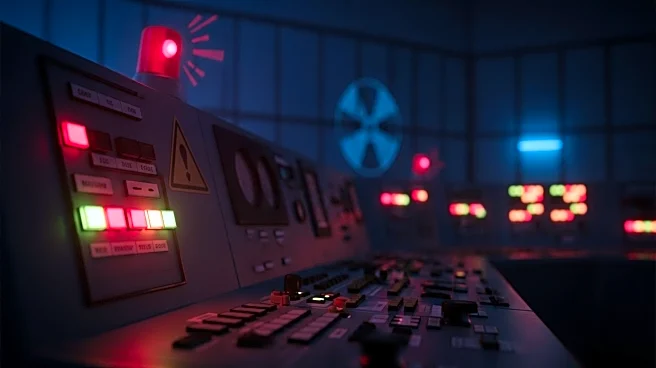What's Happening?
Ukrainian President Volodymyr Zelenskyy has declared the situation at the Zaporizhzhia nuclear power plant as 'critical' following a seven-day power outage. The plant, which is the largest in Europe, has been disconnected from the power grid due to Russian shelling, according to Zelenskyy. This marks the longest period the plant has been without power since Russia's full-scale invasion of Ukraine in February 2022. The facility's emergency diesel generators are currently providing power, but one of these generators has failed. The plant's reactors, which previously supplied about 20% of Ukraine's electricity, have been shut down since Russia seized control early in the conflict. The International Atomic Energy Agency (IAEA) is working to restore offsite power, emphasizing the unsustainable nature of relying solely on emergency generators for nuclear safety.
Why It's Important?
The ongoing power outage at the Zaporizhzhia nuclear plant poses significant risks to nuclear safety, as the facility requires power to maintain cooling and safety systems. A failure in these systems could lead to a nuclear incident, with potentially devastating consequences for Ukraine and neighboring regions. The situation underscores the vulnerability of critical infrastructure in conflict zones and highlights the broader implications of military actions on civilian nuclear facilities. The IAEA's involvement reflects international concern over the potential for a nuclear disaster, which could have far-reaching environmental and humanitarian impacts. Both Russia and Ukraine have accused each other of endangering the plant, illustrating the complex geopolitical tensions surrounding the conflict.
What's Next?
The IAEA is actively engaging with both Russian and Ukrainian officials to restore power to the Zaporizhzhia plant. The agency's chief, Rafael Grossi, has stated that while the plant is currently managing with emergency generators, this is not a sustainable solution. The IAEA's permanent monitors at the site are working to ensure nuclear safety, but the situation remains precarious. The restoration of power is critical to prevent a nuclear accident, and diplomatic efforts are ongoing to address the power outage. The international community is likely to continue monitoring the situation closely, given the potential for a nuclear disaster.
Beyond the Headlines
The situation at Zaporizhzhia highlights the ethical and legal challenges of protecting civilian infrastructure during armed conflicts. The risk of a nuclear incident raises questions about the responsibilities of warring parties to safeguard such facilities. The ongoing conflict in Ukraine may prompt discussions on international protocols for the protection of nuclear sites in war zones, potentially leading to new agreements or regulations. Additionally, the crisis underscores the importance of international cooperation in nuclear safety and the role of organizations like the IAEA in mitigating risks.








